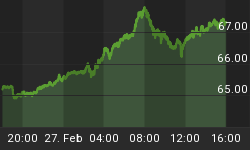This is an interesting video taken from CNBC's "Squawk On The Street".
The show's host, Mark Haines, is incredulous that last Tuesday's consumer confidence number came in lower than expected. Haines mutters: "What the heck is that all about?" As Haines goes onto explain, housing is higher in most major markets and corporate profits are better. The only thing missing was the next statement out of his mouth, and I will fill in the blanks: "What do people want?"
It just goes to show how divorced Wall Street is from Main Street.
The show's talking heads or those people in the boxes suggest that the real angst Americans have is rising gas prices at the pump, increasing health care costs, and an uncertain labor market. This is all true, but I don't think that it is the real source of America's angst.
The real source of America's angst is a sense that something is terribly wrong. What that something is isn't tangible - like higher gas prices - but it is palpable. Maybe it is the lack of leadership in Washington or the inability of that leadership to do anything but put our problems off for another day.
There is no collective purpose to the actions coming out of Washington. There is no common cause that Americans can rally around. Bailouts and government programs, like "cash for clunkers", have perpetuated the same old thing. The bailouts have favored the connected or those who where irresponsible in the first place. Is this the American way?
This is not the change that Americans wanted. They voted for it, but this is not the change that Americans wanted.
So what kind of change did Americans want?
For this we need to go back to September, 2001 and the War on Terror. With the attack on America, President Bush was handed a golden opportunity to galvanize Americans in a common cause, but instead all he asked of his fellow countrymen was to go to the malls and continue shopping. The soldier in combat made the sacrifice, but this is what they do. Their sacrifice was unconditional, and this was understood and accepted by all. But where was the sacrifice asked of the ordinary American here at home? At the very least, shouldn't we have been asked to cut back on our consumption of large cars and oil to decrease our reliance on those very same foreigners who were at war with America? I am sure my fellow citizens would have been willing to act for the greater good, but they were never asked. This was President Bush's biggest failing.
Now we come to President Obama. His crisis isn't the War on Terror, but a generational economic crisis. President Obama did come to the electorate and say "we need to change the way we do business" referring to the grid lock and bipartisanship in Washington. I think the President believed this. From an idealogical perspective, Republicans and Democrats need to work together to solve the problems this country faces.
Despite the political rhetoric, President Obama did not understand the kind of change Americans seek. It isn't so much what he has done (i.e., wasted a lot of money) but what he has failed to do (i.e, galvanize the country in a common cause) that is so discouraging. Even if the other guy (Senator McCain) was elected, he probably would have done the same thing - thrown good money after bad - as this was what was being recommended by the economic of this country. Oh, these were the same economic leaders who missed the crisis in the first place.
But like his predecessor, President Obama is missing what kind of change Americans really want and why there continues to be so much dissatisfaction. Americans are willing and ready to make that sacrifice to improve their nation and the future of this nation for their children - provided that burden is shared by all. The only problem is that no one has asked them to make that sacrifice for a common cause, and the window of opportunity for the Obama administration to come to the American people and unite them toward a common goal has closed or is closing quickly.
As measures to resuscitate the economy begin to peter out, the fragile underpinnings of the economy will begin to be exposed yet once again. The likelihood of throwing more money after the problem - in front of a mid term election - is becoming increasingly diminished. With no real economic catalyst to sustainable growth and with very little fixed after this crisis, one really needs to ask what does the Obama economic team do next?
One thing is for sure: the time to ask the American people to unite in a common goal passed long ago when the President first took office. This was the one option that has been squandered, and this is why Americans remain so dissatisfied.















